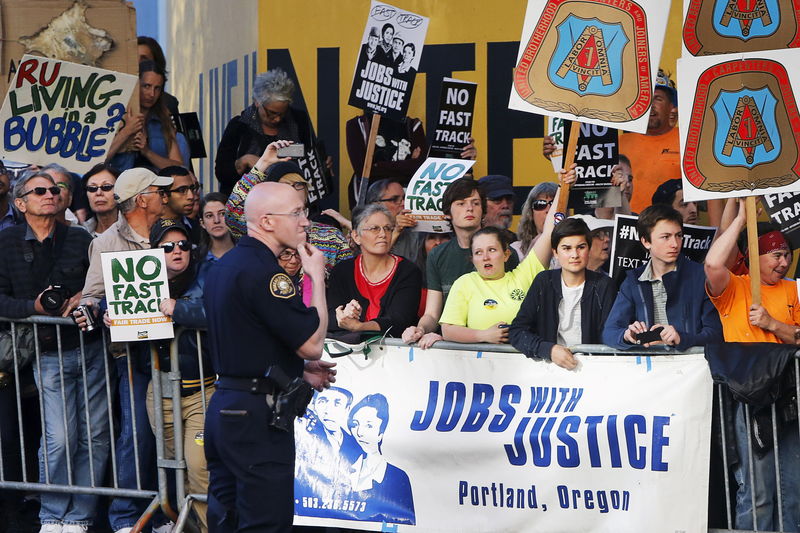By Krista Hughes and Richard Cowan
WASHINGTON (Reuters) - U.S. President Barack Obama's push for a pan-Pacific trade pact, a key part of his strategic pivot to Asia, suffered a major blow at the hands of Senate Democrats on Tuesday when they blocked debate on a bill that would have smoothed the path for the deal.
The stunning outcome cast doubt on the Trade Promotion Authority (TPA) "fast track" bill which is key to the Obama administration's ability to complete the 12-nation Trans-Pacific Partnership (TPP).
Washington's negotiating partners say enacting U.S. fast-track legislation to expedite passage of any trade deal is vital to clinching an agreement that would create a free trade zone covering 40 percent of the world economy.
"It will be difficult for TPP countries to close negotiations without TPA," a Japanese government official familiar with the talks told Reuters, referring to the fast-track legislation, known as the Trade Promotion Authority.
Failure to clinch a U.S.-led TPP agreement could also damage Washington's leadership image in Asia, where China is forging ahead with a new Beijing-led Asian Infrastructure Investment Bank (AIIB) without the participation of the United States and Japan.
The Senate voted 52-45 - short of the 60 votes needed - to pave the way for debate on the "fast-track" trade authority for Obama. "What we just saw here is pretty shocking," said Senate Majority Leader Mitch McConnell, a Republican.
The vote marked a victory for Senate Democratic leader Harry Reid, an outspoken opponent of fast-track, after weeks of speculation that the toughest fight would be in the House of Representatives and not the Senate.
Under fast-track, Congress can approve or reject trade deals negotiated by the administration but not amend deals such as the TPP, a potential legacy-defining achievement for Obama.
Pro-trade U.S. Senate Democrats, including Senator Ron Wyden of Oregon, insisted that fast-track authority be bundled together with three other trade bills, including one that would impose import duties on countries that manipulate their currencies for unfair trade advantage.
The White House strongly opposes the measure. A source familiar with negotiations in the Senate said one option would be to bundle the four bills together but take out the currency provision. That could be voted on separately, said the source.
Senate Finance Committee Chairman Orrin Hatch, a Republican, told reporters that it could take a day or two to broker a compromise while Democrats predicted it would come back.
"I don't think today's vote is a death knell for TPA, but it is a very strong warning shot to the majority leader ... that without worker protections, without enforcement provisions, they will likely not move forward," Democratic Senator Chris Coons told reporters.
'PROCEDURAL SNAFU'
Negotiations on the TPP are nearly complete, but trading partners have said they want to see fast-track legislation enacted before finalizing the pact, which would stretch from Japan to Chile. That would create the biggest trade deal since the North American Free Trade Agreement liberalized trade between the United States, Canada and Mexico.
More than two decades later, that pact is blamed by many on the left in the United States for factory closures and job losses and has soured sentiment toward the TPP.
Now, McConnell faces the tough choice of possibly bending to Democrats' demands and in so doing, losing Republican votes in the Senate and House.
White House spokesman Josh Earnest played down the day's developments as a "procedural snafu" and said the White House would continue to work to push the legislation forward.
Only one Democrat, Senator Tom Carper of Delaware, backed the measure, despite a White House campaign blitz to win Democratic support.
Obama held a "constructive" meeting on Tuesday afternoon with 10 Senate Democrats to discuss how to advance fast-track legislation, the White House said in a statement.
Senate Republicans stuck together in voting to let the bill pass its first test. However, McConnell at the last minute changed his vote to "no" in a procedural move that lets him bring the bill to a vote again in the future.

The failure to secure the needed votes sent a worrying signal about the level of support for fast track, which is opposed by unions, environmental and consumer groups but backed by businesses, which reacted with disappointment.